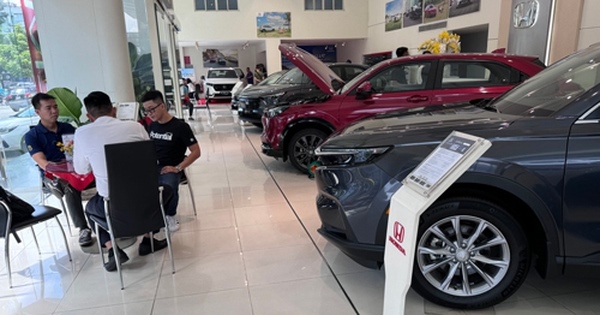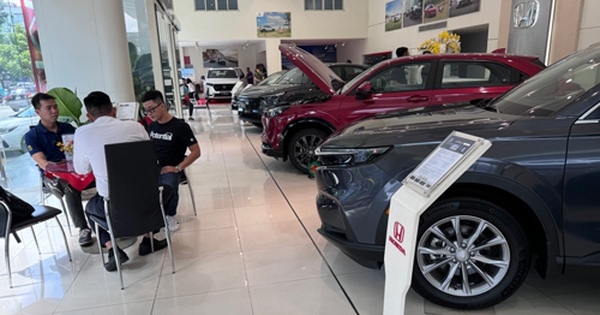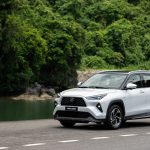Hybrid Cars: Gaining Traction in Vietnam with a Balanced Approach to Eco-Friendliness and Practicality
The harmonious combination of traditional gasoline engines and electric motors makes hybrid vehicles an appealing choice for those seeking to “green” their journeys without the range anxiety associated with electric vehicle charging infrastructure.
Japanese Brands Dominate
According to the Vietnam Automobile Manufacturers’ Association (VAMA), sales of hybrid vehicles have significantly increased just two years after their introduction to the market. In 2023, approximately 3,800 hybrid vehicles were sold, a number that nearly tripled to 10,000 in 2024. This positive trend continued into the first quarter of 2025, with nearly 3,000 hybrid vehicles sold, double the sales from the same period last year.
March 2025 marked a remarkable milestone, with 902 hybrid vehicles sold, reflecting a 16.2% increase from the previous month and a 28.5% surge compared to March 2024. Southern Vietnam led the way in consumption with 446 vehicles (43.62%), followed by Northern Vietnam with 342 vehicles (32.98%) and Central Vietnam with 114 vehicles (23.4%). These figures highlight a distinct shift in consumer preferences, as hybrid vehicles offer not only fuel efficiency but also align with the current traffic conditions and infrastructure in Vietnam.
 Hybrid vehicles are gaining popularity due to their convenience and fuel efficiency. |
The hybrid segment in Vietnam is currently dominated by Japanese brands, with Toyota taking the lead. The company accounted for over 60% of the hybrid market share in the first quarter of 2025, selling 1,486 vehicles. Toyota offers six hybrid models, including the Yaris Cross, Corolla Cross, Corolla Altis, Camry, Innova Cross, and Alphard.
Notably, several Toyota hybrid models have outperformed their gasoline-powered counterparts in sales. For instance, the Toyota Camry hybrid sold 242 units in the first quarter of 2025, almost double that of the gasoline version (195 units). Similarly, the Innova Cross hybrid achieved sales of 609 units, while the gasoline version sold only 100 units.
Honda and Suzuki are also in the race, making their mark with models like the CR-V e:HEV RS (nearly 500 units sold) and the Civic e:HEV RS, with the recently launched HR-V e:HEV RS joining the lineup in mid-April 2025. Suzuki, with its XL7 Hybrid, unexpectedly surpassed other competitors by selling 574 units in the first quarter, becoming the best-selling hybrid model in March with 275 units sold. Mitsubishi is also gearing up to join the competition with plans to introduce hybrid versions of the Xpander and Xforce, further heating up the market.
Chinese Brands Join the Fray
While Japanese brands reign supreme, Chinese automakers are also making inroads into the hybrid market in Vietnam. The BYD Sealion 6, a plug-in hybrid electric vehicle (PHEV) and the most affordable hybrid on the market, has attracted attention despite some controversies surrounding its marketing. Other Chinese models like the Jaecoo J7 PHEV, Haval Jolion hybrid, and GWM Tank 300 hybrid are also vying for market share alongside their Japanese competitors.
Boosting Sales: The Role of Incentives
According to PGS-TS Dam Hoang Phuc, Director of the Automotive Engineering Training Program at Hanoi University of Science and Technology, the appeal of hybrid vehicles lies in their perfect balance between economic efficiency and environmental friendliness. These vehicles can reduce emissions by up to 50% in urban areas and at least 20% on highways compared to internal combustion engines. Research from the university also indicates that hybrid vehicles can save 30%-50% in fuel costs, significantly reducing operating expenses for owners.
Mr. Doan Cong Dung, manager of a car showroom in Tan Binh District, Ho Chi Minh City, shared that customers are increasingly embracing hybrid vehicles after initial concerns about the complexity of the technology. “Initially, people thought that hybrid batteries were difficult and expensive to repair. However, in reality, hybrid systems only add an electric motor, battery, and converter, making them easier to maintain than gasoline vehicles,” he explained. Moreover, with a battery warranty of up to seven years and affordable replacement costs, hybrid vehicles are no longer seen as a financial burden.
Overcoming Price Barriers
Despite their growing popularity, hybrid vehicles in Vietnam still face price barriers. Currently, hybrid cars are subject to the same excise tax as gasoline cars, making them approximately 100 million VND more expensive. Mr. Nguyen Trung Thang, Tax Director at KPMG Vietnam, emphasized that tax incentives are crucial to boosting this segment. The draft Law on Special Consumption Tax (amended), expected to be passed by the National Assembly in May 2025, proposes a tax rate for hybrid vehicles at 70% of the tax rate for gasoline cars, offering a potential price reduction.
Mr. Thang cited examples from other Southeast Asian countries like Thailand and Indonesia, where special consumption taxes for hybrid vehicles are significantly lower, ranging from 8% to 40% of the tax rate for gasoline cars. This has made hybrids more accessible and affordable in those markets. If Vietnam adopts a similar approach, the price difference between hybrid and gasoline vehicles could narrow to less than 50 million VND, making hybrids more attractive to consumers. According to VAMA, tax incentives could result in a reduction of over 2.6 million tons of CO2 emissions from hybrids between 2026 and 2030, equivalent to a budget savings of 333 billion VND in carbon credits.
With an expected growth rate of 25%-30% in 2025, hybrids are projected to capture 15%-20% of the total passenger car sales in Vietnam. Experts believe this trend sets an ideal foundation for the transition to greener transportation, especially considering the current limitations in electric vehicle charging infrastructure.
Toyota Vietnam asserted that hybrid vehicles offer a practical solution that aligns with existing user habits and infrastructure. Meanwhile, brands like Honda, Suzuki, and BYD are expanding their hybrid portfolios, setting the stage for intensified competition within the hybrid segment and against other vehicle categories.
|
BYD Sealion 6: Stirring Up Controversy The introduction of the BYD Sealion 6, a PHEV with a starting price of 899 million VND, created a buzz in the market. However, BYD’s marketing strategy of positioning it as a “gasoline-electric hybrid” rather than an “electric-gasoline hybrid” sparked controversy. In reality, the Sealion 6 primarily relies on a gasoline engine, with an electric motor and a chassis design from the early 2000s as supporting features. Despite being advertised as capable of traveling 1,200 km on a full tank of gas and a charged battery, the actual fuel consumption is 6 liters/100 km when the battery is depleted, falling short of expectations. Its slow acceleration and a price point that isn’t significantly lower than that of pure electric vehicles have left consumers underwhelmed. |
Article by NGUYEN HAI
– 08:44 27/04/2025

















